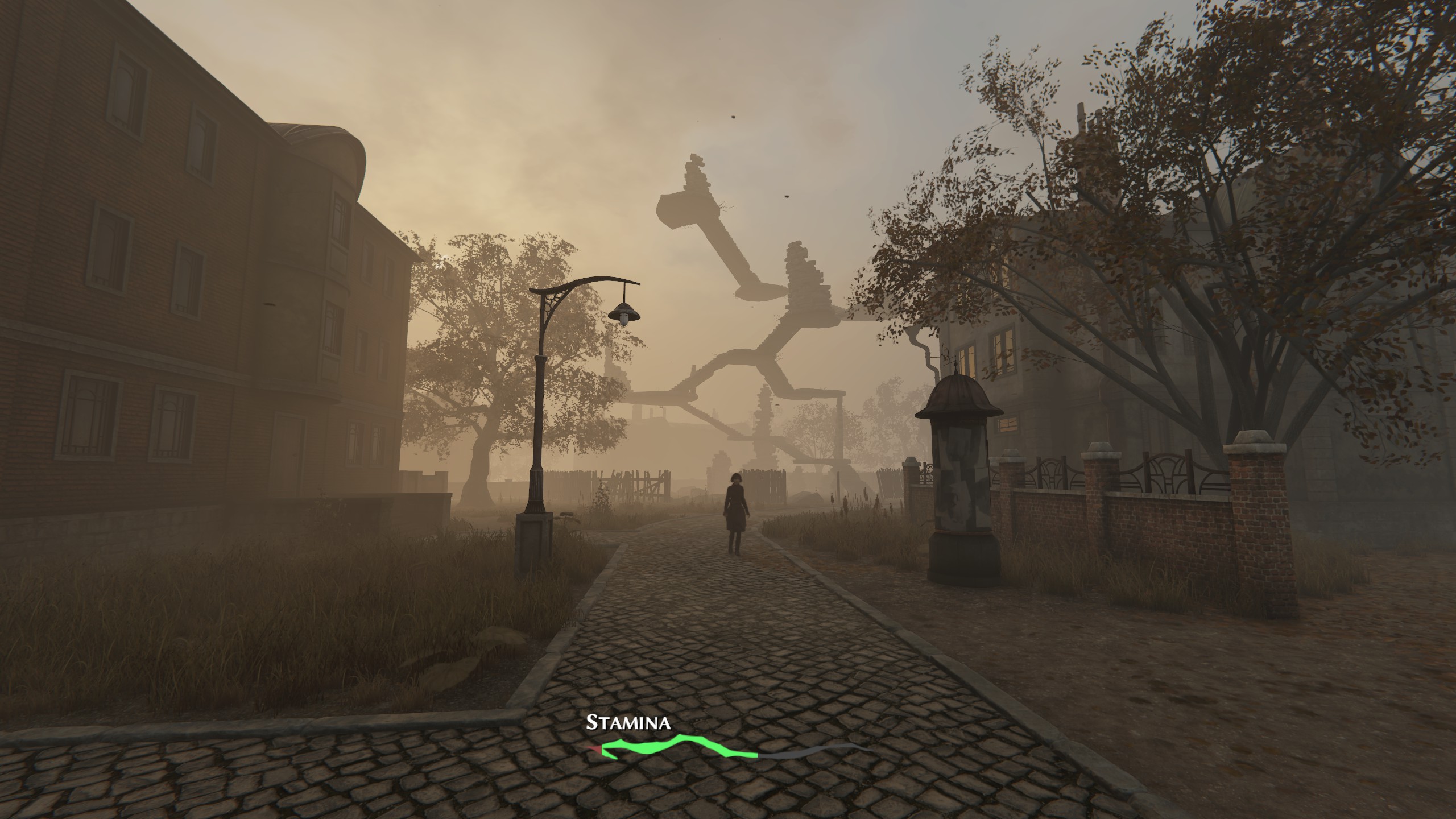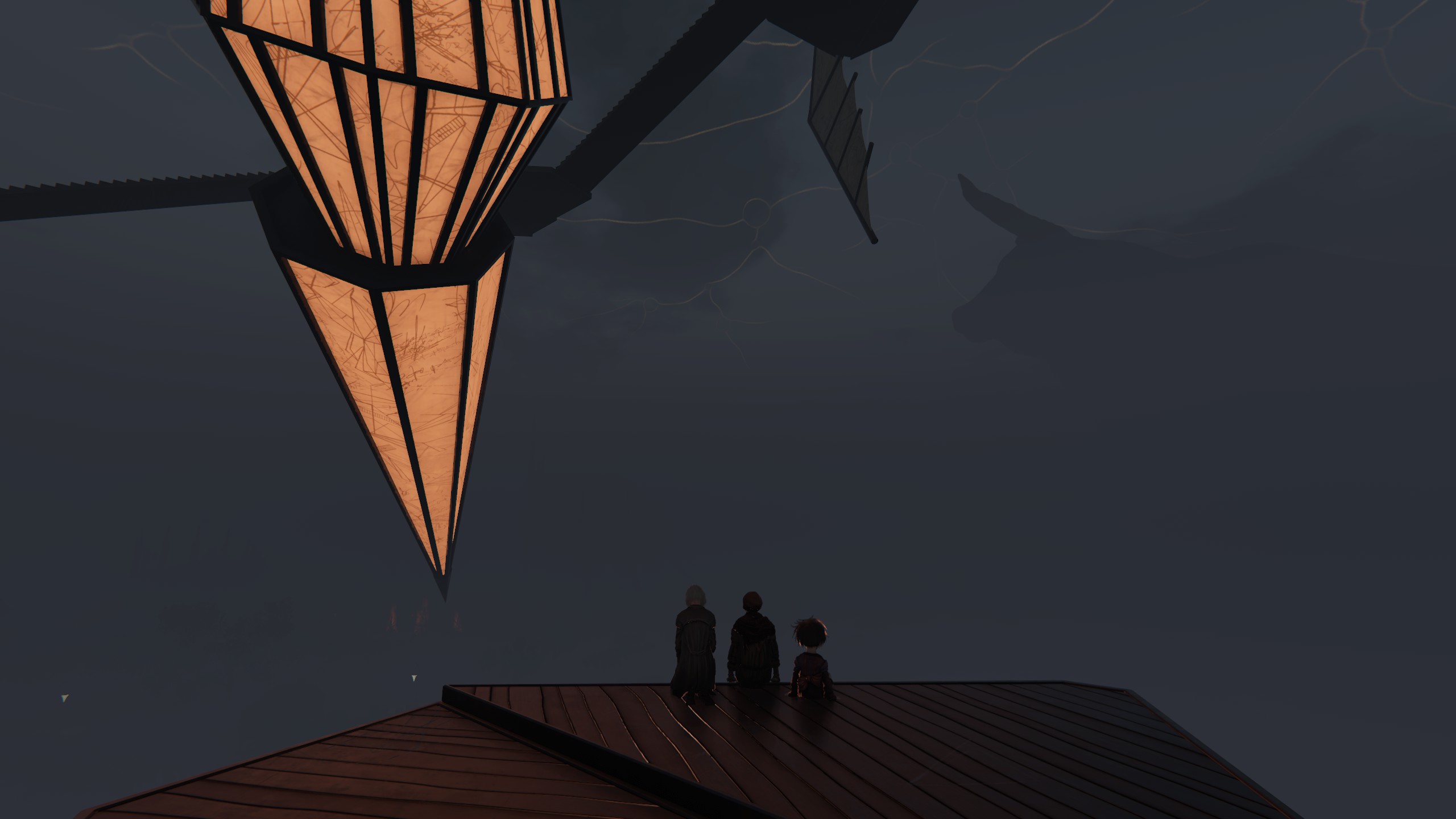Thoughts on Pathologic 2
I will spoil the entire game of Pathologic 2 below. If you have not played it, you should. It’s one of the greatest ever made. Also, keep in mind that it’s the kind of game that lends itself to different interpretations, so if we disagree on something I touch upon here, that’s fine.
Pathologic 2 is an alienating game. The setting is unlike anything else I’ve seen in any medium (perhaps the same could be said of not only the setting). In this nameless town in the steppe of a nameless country (probably Russia, but it’s not specified), an ancient people’s ancient traditions have been dying out as they move out of the unending plains and into the town, mostly into the poorer and more degraded quarters around the meat factory that powers the economy. This ancient people, the Kin, has always cut bulls open and drained their blood into the earth to grow strange herbs, and the factory is annexed to an abattoir where bovine guts have been spilled since ancient times. Kin are poor and live in bad conditions, but those who have it worst are not people, but worms, strange, short, neckless creatures made of the humans’ leftovers. Their female counterparts, as game tropes dictate, are not monsters, but scantily clad women who will dance to summon herbs until their clothes come off. The less traditional humans are no less unconventional: the people behind the town’s structure built a huge cathedral where a giant clock dictates how time passes, and have hired architects from the capital to design a building that would defy physics, a Polyhedron that stands at the opposite side of the town to the Abattoir, growing up into the sky with no visible foundations that speak of, echoed in several failed attempts of stairways to heaven throughout the town. Near the Polyhedron and the cathedral is where the richest and less traditional citizens live, in geographical and rational opposition to the Kin.

A train station at the south end of town provides the only connection with the outside world, and the protagonist (or one of them, in case the others have been added when you’re reading this) arrives on a train looking for his father, greeted by three men looking to cut him open and leave him dying by the tracks. Somehow, he manages to fight back and kill all of them, only to find out that his father has already died by murder and he’s the main culprit. The actor playing Artemy Burakh, the protagonist, in the theatre play that is a metatextual layer above the main story, and the player playing that actor, know that this is a second attempt at the play, much like this game is a second attempt at telling the story of Pathologic. There will be a plague, people will die, Burakh will suffer, and we will be along with that suffering. This, combined with the setting, makes for a rather intense few hours, but this game is relentless at making you feel out of place. Even when you open your inventory, it doesn’t want to let you let go of the feeling that something is weird with everything: the inventory menu is called “things”, and the questlog “thoughts”. It’s something special even here, and whereas other games will use these clinical terms that every other game uses for their menus, in Pathologic you’re still inside the game’s fiction. I’ve heard comparisons to Dostoyevsky being thrown around this game but besides the story having an insufferable city dandy that is oh-so-smarter than these country rubes that surround him (Dankovsky, an alternate protagonist who I hope gets his own story in the second game someday, does remind me of Ivan Karamazov somewhat), I’d say that the style of dialogue could not be more different. Rather than the dozen-page-long, complex conversations of the Russian author, Pathologic’s dialogue is as if, quoting Burakh, “you’re talking past each other”. Remember, the people talking are citizens under stress in a town going through hell, but they’re also actors playing out their lines, and it often feels that what you reply to them isn’t recognized. This could be poor writing, but I wouldn’t say so: it’s more like poor acting because the actors are too fixed on the script to be able to react to something strange you’ve said. Or maybe you’re the poor actor, going off-script and off-character, not playing your part? Either way, the style of dialogue often makes you even more uncomfortable and alienated in a game where all aspects are already working at their best to do so.

Lots of digital ink has been spilled over about difficult games, and about Pathologic 2 being one of them, unless you choose to lower the difficulty yourself (this is not recommended by the developers, and if you turn the difficulty back to “intended” you even get the sound of a child cheering you on - the sound that plays when you gain reputation in the first game, I believe), but something to note here is that one of the most cruel parts of the difficulty is not adjustable. You may tweak how long it takes for you to starve, and how likely you are to rise out of a messy street fight as victor, but you are still unable to tweak the likelihood of the town’s cast getting infected and subsequently dying from such an infection. The difficulty is adjustable for parameters that directly affect Burakh, but - at least in my experience -, having more time is not going to help you all that much with saving people. Even if you visit everyone every day and give them all the care you can, the midnight bell will toll, and along with it, death will come to some NPC. There is no way to adjust the difficulty to give you more shmowders (pills that completely heal the plague), and you can’t adjust the probabilities of infection or death. This shows that the willingness of Ice-Pick Lodge to make the game more accessible stops at making it easy enough for you to stop dying so much, thus removing a lot of the friction of being able to keep on playing the game, as further adjustments would not only remove the experience of struggling with finding food, water and time to rest, but also the awful feeling that, despite all your efforts, you could not save everyone.

The game has a Big Ending Choice, of course, and it is one of the most argued-about questions in perhaps all of human history. Do we reject the new things that might just be inevitable, and hold out for an indefinite period safe in what we’ve always lived with, or do we embrace them fully aware of such embrace not being a lossless process? Do we move from the countryside to the growing, bustling, overpopulated, and overpolluted cities in search of a better life, trading peace, quiet, and fresh air for a chance at a higher-paying job and more opportunities? Do you reject new technology, smartphones, and social media, in the conviction that their ability to connect us with others is too offset by their tendency to destroy our focus and self-esteem, and make us angry or preoccupied at things that we have no way of affecting? Do the Romans abandon their millenium-old pagan ways for this newfangled Greek tale of a thirty-three-year-old immortal from Judea? Does the Haruspex Burakh, and the actor playing him, directed by Mark Imortell, and you, directed by some combination of will, YouTube videos, reviews, and algorithmic recommendations, allow this marvellous and unique culture to prosper and survive atop a city-wide mound of dead, decayed, infected urbanite flesh and bone, or do they refuse to delay what is likely inevitable? This choice is in every conversation we have with the Kin, as we decide whether to scoff at their primitive language and traditions or to reply in kind, embracing them, and this question reverberates through the game until it reaches this moment, at which the protagonist edges close to the powerful video game protagonist that makes the big choice at the end, rather than a normal person thrust into too much responsibility. Not that this choice feels too grand, of course, since it boils down to either delivering some papers or not doing so.

In embracing what must eventually come, you destroy the Polyhedron. This one-of-a-kind building is inhabited only by children, and because of that, it always felt to me like it symbolized the unencumbered ambitions and dreams that we have in a tender age. The Polyhedron defies any limit set by architecture and engineering and stands higher than anything in the town. By destroying it, you spill rivers of blood as prophesied, enabling you to heal whoever survived these twelve days of trials, but you also bring the children down from the sky (the limit of their ambition) and into the earth. It is by doing this that you ensure that they will become the next generation of citizens, rulers, and mistresses. One could say it’s grim that you are (in my interpretation) destroying children’s dreams, bringing them down to the filthy earth of reality again, but that one would not be an adult. (I’m not going to be an astronaut, but that’s fine.) The children have already buried the doll, which, sure, alludes to the Heart of the town since they call it the Eighth, as in the eighth child that Burakh is tasked by his late father with caretaking, but it felt to me like they were also letting go of their childhood, of their innocence and playfulness.

The game ends, the curtains close, the actor playing the role of Artemy Burakh is paid for a job well done, the credits roll, you click Exit, and get back into whatever ugly wallpaper you have on your desktop or something. Nothing changes. Except if you’re like me, you’ll feel that you experienced something very special. I have a bad habit of not taking notes as I read a book or play a game, and I wish I had done so for this second playthrough that I did, as I would probably have had fun writing some more random thoughts into this rambling post.
Thanks for getting here. I don't promise to keep making more things like what you just read, but if you're interested in knowing if I make something new, follow me on Twitter.